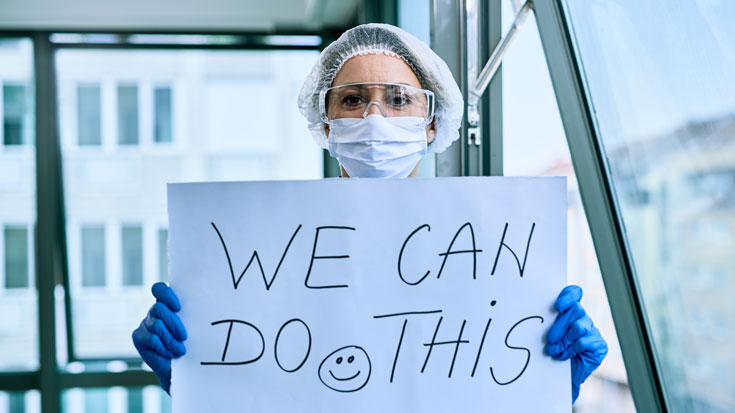
Fueling a passion for your profession is essential in any field, and respiratory care is no exception. Over the past year of the pandemic, therapists had to put those kinds of activities aside to ensure their hospitals would have what they needed to care for the influx of patients.
Tony Garberg, RRT, director of cardiopulmonary services at Good Shepherd Medical Center in Hermiston, OR, is one of them.
Joy in teaching children
Before the pandemic, Garberg kept busy with the usual work required to keep his department operational. But he found particular joy in going out into the community to educate children about the respiratory system and the respiratory care profession.
“At one point in my RT career, I was a part-time community health educator,” explains this veteran of military service. “I then started teaching BLS, ACLS, ACLS-EP, and NRP to staff.”
Those experiences encouraged him to take his love for teaching out to work fairs at local middle and high schools, sharing all that the respiratory care profession has to offer. He even participated in an “Ask the Expert” session during a high school health class. When his own children were younger, he would take a pig lung display into their classrooms and talk to the children about the dangers of smoking and using drugs. He has a friend who teaches middle school and has visited his classroom to impart his knowledge of the respiratory system several times.
“Of all the things I have had the pleasure of doing, teaching the kids about the cardiopulmonary system and showing them what drugs can do to it is priceless,” he says. “There is nothing as rewarding as volunteering your time to help someone else, but when that someone else is a group of kids, it is even more rewarding . . . It is truly a privilege to work with kids and provide them with knowledge and experiences that they will remember for a long time.”
Pandemic takes precedence
Of course, none of that has been possible in this past year. In Garberg’s community, schools have been all virtual for much of the time, with his own children only now just beginning to venture back into in-person learning. He was able to coach his daughter’s softball team for a short time last fall, and since he lives on a couple of acres, he’s been able to have a small group of boys over to work in his shop from time to time as well.
But the school visits were put on indefinite hiatus, and a similar situation has played out at work. “In the hospital, we are still allowed no more than six people for any indoor events,” he says.
The focus shifted to the pandemic, and Garberg and his staff went all in to do their part.
“Work has been crazy,” he says. “My RT department has taken on a very big role here in the hospital.” One area where they assumed the lead was in mask fitting for the staff. The hospital opted not to use N-95s. They instead switched out nearly the entire front-line staff to half-face respirators with P-100 filters. His department did all the fit testing for the new masks.
“It has been a pretty big job and required some long hours to accomplish everything,” says Garberg. Good Shepard has been appreciative of the effort. “The hospital wrote an article about it, which was nice,” he says.
He and his staff have also worked overtime to ensure patients who needed cardiopulmonary rehabilitation would still have access to it. After shutting their program down for about six weeks last year, they could open back up with a myriad of changes and have yet to see another closure.
“It has created a very different program and a lot more work, but we are still open, and we have maintained our maintenance program through it all,” he says.
He’s faced some staffing challenges during this unprecedented year as well, and his staff is a bit tired at this point. But they’ve persevered, and he applauds their dedication to the team. “I am very proud of my staff, and the pandemic has just been a way for them to shine through it all,” he says. “They were rock stars.”
Job well done
When life returns to normal, Tony Garberg will undoubtedly go back to the typical challenges of running an RT department and rekindle his passion for educating young people out in the community about the respiratory system and the respiratory care profession. But like everyone else in the field, he’ll look back on this time in his career as one that challenged him to reach for his best, and he’ll be proud that he was able to do it.





